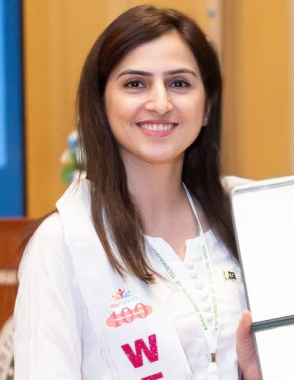Hira Ashraf
“Envisioning a greener energy sector"
I grew up watching my city of Lahore go from one of the cleanest and greenest cities in the country to one of the top 5 most polluted cities in the world.

“Envisioning a greener energy sector"
I grew up watching my city of Lahore go from one of the cleanest and greenest cities in the country to one of the top 5 most polluted cities in the world.

For young engineers like Hira, climate change and environmental pollution are sore subjects– they changed the face of their beloved hometowns, and tainted childhood memories of their cities.
Lahore gets routinely engulfed in smog, with the exorbitant rise in vehicular emissions and unregulated urbanisation/ industrialisation to blame. This heavy blanket of smog has led to a steep rise in fatal health issues among the local populations, such as asthma, cardiac and respiratory tract infections to name a few.
"Hira’s drive to make an impact brought her to the energy sector, hoping that her industry will directly or indirectly provide solutions to interconnected issues on GHG emissions."
Hira participated in the SAR100 2.0 course, studying alongside 110 women from Bangladesh, Bhutan, India, Nepal, Maldives, Pakistan and Sri Lanka for 6 months. The participants received training in multiple topics such as renewable energy (RE) integration, power trading, and AI technologies.
The SAR100 course provided Hira with the push that was required for her to explore new horizons, especially in terms of contextualizing the ever-changing industry.
"Hira now hopes to pursue a master’s degree in renewable energy and sustainability in the future, taking the next step towards scaling RE solutions in her country."
SAR100 paved the way for Hira to envision her role in the energy sector in Pakistan. She plans on leveraging the contacts made across South Asia to get a better regional understanding of the challenges and get inspiration from other South Asian countries’ strategies.
"If you want to learn how to swim, you have to jump in the water. So, jump I did. I have been invited to speak as a mentor for a women-in-STEM event, all because of the confidence that SAR100 gave me, which is now reflected in my conversations and in my actions."